Here is your guide to earning a coding degree online! Earning a coding or computer programming degree online could help you break into the computer and information technology industry.

If this is a career path you would like to pursue, this article can help you figure out where to start.
Editorial Listing ShortCode:
We will be discussing admissions requirements, coursework, and what types of jobs you can qualify for once you have earned your coding degree.
Online Coding Degrees
If you are interested in learning how to become a computer programmer, there are a couple of different types of computer coding degrees, such as computer programming and computer science. These two feature slightly different curricula, but either one can help prepare you for a career in coding.
Select the program that most interests you to jump to that section of the guide:
Although there may be some crossover between computer programming and computer science careers, there are some important distinctions to consider.
Computer Programming

A computer programming major can provide you with extensive knowledge of programming languages, such as C++, Java, and Python. You can study how to design software and write instructions that a computer can follow.
You can also learn how to test programs to see how well they actually work, and you’ll subsequently practice debugging programs and fixing errors. Your program may also allow you to take electives in related subjects, such as computer graphics or artificial intelligence.
Editorial Listing ShortCode:
Additionally, you may complete courses in subjects like business or science. This can allow you to have a well-rounded education, preparing you to understand the operations of corporations, laboratories, and other work environments in which you might find employment.
A computer programming degree might be most suitable for prospective software developers and computer programmers. The skills you learn in a computer programming degree can also apply to other types of jobs related to computers and information technology.
Computer Science

A computer science degree is another option for an aspiring software programmer. This type of degree is typically broader in scope than a computer programming degree.
Computer programming languages are often included in the curriculum of a computer science degree, but you’ll also study other aspects of computing. This can include hardware, computer organization and architecture, networking, database management, and systems analysis.
Computer science degree programs often include higher level math, such as calculus and discrete mathematics. In addition to coursework, you may also have the opportunity to complete a capstone project.
Editorial Listing ShortCode:
At some schools, you might have the chance to earn a computer science degree with a concentration in programming. Other concentration options can include computer security, data mining, or machine learning.
Common computer science careers include computer and information systems manager, computer systems analyst, and network or computer systems administrator.
Computer Coding Careers & Salaries
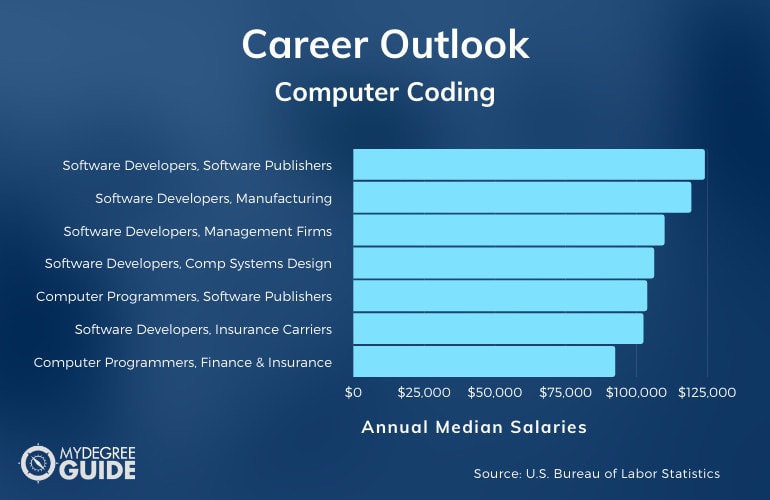
Common occupations for graduates of computer coding programs include software developer, computer programmer, web developer, and digital designer.
According to the Bureau of Labor Statistics, here are some computer coding careers:
| Careers | Annual Median Salaries |
| Software Developers, Software Publishers | $124,050 |
| Software Developers, Manufacturing | $119,280 |
| Software Developers, Management Firms | $109,840 |
| Software Developers, Computer Systems Design and Related Services | $106,160 |
| Computer Programmers, Software Publishers | $103,710 |
| Software Developers, Insurance Carriers and Related Activities | $102,380 |
| Computer Programmers, Finance and Insurance | $92,390 |
| Computer Programmers, Manufacturing | $89,530 |
| Computer Programmers, Computer Systems Design and Related Services | $88,510 |
| Web Developers and Digital Designers | $77,200 |
Because of the widespread use of technology in almost all areas of society, software developers and computer programmers can work in almost any industry. The top industries in which they are employed include software publishers, manufacturing, management firms, and computer systems design and related services.
Coding Curriculum & Courses

Here are examples of some courses you might take for a coding program, including classes on coding and related fields, such as computer science:
- Introduction to Computing: This course provides you with an overview of the field.
- Programming Fundamentals: This course teaches you how to manage operating system files and design basic algorithms.
- Algorithms: This course teaches you how to analyze and use algorithms.
- Computer Architecture: This course teaches you about the interaction between computer hardware and software.
- JAVA Programming: This course teaches you how to use JAVA, a common computer programming language.
- C++ Programming: This course teaches you how to use C++, a common computer programming language.
- Data Structures: This course teaches you how to organize and store data efficiently.
- Computer Networks: This course teaches you about how to create networks and how to solve problems related to security or other issues.
- Software Testing: This course teaches you how to evaluate software and system components.
- Game Programming: This course covers topics such as 2D and 3D design as well as how to apply physics to a game.
Exact course titles and requirements can vary between schools and programs.
How to Choose an Online Coding Degree Program

There are many different types of online programming degree programs available. When you are trying to choose a school, here are some factors you may want to consider:
- Affordability. You may be interested in finding a school that charges relatively low tuition rates or offers generous financial aid packages.
- Transfer policies. If you have already earned college credits elsewhere, you may want to ensure that your new school will accept those credits towards a degree.
- Student-teacher ratios. You may prefer a school with small class sizes so that you can get more personalized attention.
- On-campus requirements. Some online degree programs are entirely online, while others may require that you come to campus occasionally for lab courses, seminars, or other events.
- Scheduling options. Some programs offer classes during evenings or weekends. Other programs may follow an asynchronous format, in which lectures are recorded and all coursework can be completed according to your own schedule.
- Job placement rates after graduation. On a school’s website, you might be able to find the rate of how many graduates found employment.
- Part-time or full-time options. A program that uses a cohort model may require students to enroll in classes full-time. Other types of programs may allow you more freedom with regards to choosing each semester’s course load.
There are many different types of online degree programs, so it can be beneficial to look for one that suits your personal needs and preferences.
Admissions Requirements

What expectations do coding degree programs usually have for prospective students? Here are some common admissions requirements:
- High school diploma or GED
- Grade point average of at least 2.0
- Essay or personal statement
- Letter of recommendation from a teacher or other mentor
Some colleges might also ask you to submit SAT or ACT scores, but a growing number of schools are no longer requiring these. Other schools may waive test score requirements if you have a high enough GPA. Admissions standards can vary widely from one school to another.
Accreditation

Regional accreditation is a process in which schools are regularly reviewed by outside agencies to determine the quality of their academic programs.
A school that has regional accreditation has been verified to meet certain standards, so you are more likely to receive a high quality education at a regionally accredited school.
Editorial Listing ShortCode:
If a school is accredited, they will probably mention this somewhere on their website, including the name of their accreditation agency. Accreditation can be a determining factor for financial aid, and transferable credits typically have to be earned at an accredited school.
For more information on the topic of accreditation, you can visit the US Department of Education.
Financial Aid and Scholarships

If you would like to get a coding degree, you may be wondering about how you will pay for your education. There are many financial aid opportunities available for qualifying students of online coding degree programs.
You may be able to qualify for state or federal financial aid or for scholarships from the university itself. Your employer may also be willing to provide financial assistance, especially if developing your technological skills or learning to code would help you in your current job.
To apply for federal financial aid, you can fill out the Free Application for Federal Student Aid (FAFSA).
Computer Coding Professional Organizations

Membership in a professional organization can provide networking opportunities, continuing education opportunities, and other resources. Here are some professional organizations for those who work in the field of computer coding:
- Association for Computing Machinery (ACM)
- CompTIA Association of Information Technology Professionals (CompTIA)
- Computer Research Association (CRA)
All of these organizations provide excellent resources and support for software developers and other technology professionals. Aspiring technology professionals are often welcome as well.
Is There a Degree for Coding?

There are degrees for coding, a field which is sometimes called computer programming. If you are interested in learning to code, you also have the option of pursuing a degree in a broader technology field.
You might pursue a degree in computer science, information technology, information systems security, software engineering, or computer engineering. These degree programs often include coding coursework as part of the curriculum. You might even be able to choose coding as a concentration.
Many of these degree programs are for bachelor’s degrees, but you can also study coding in an associate- or masters-level program. Just keep in mind that even though the Bureau of Labor Statistics indicates that you can get a programming job with an associate’s degree with some employers, you may need to earn a bachelor’s or higher to be qualified for more advanced coding jobs.
Can You Get a Coding Degree Online?

Yes, you can get a coding degree online. Coding is actually very conducive to online study. Learning to code involves spending a lot of time at your computer, even if you are enrolled in a traditional on-campus degree program.
You can usually arrange to take proctored exams at an approved testing center near where you live, if needed. A few online programs do have on-campus components, such as seminars or an orientation. Accredited online coding degree programs teach you the same materials you could learn on campus.
What Can You Do with a Coding Degree?
Professionals with a coding degree tend to become software developers or computer programmers. You could potentially pursue a number of other careers in the field of computer and information technology as well.
Editorial Listing ShortCode:
This field is growing rapidly. Common positions include computer and information systems manager, computer support specialist, computer systems analyst, and network and computer systems administrator. Computer and coding skills are relevant to many technology-oriented jobs.
How Long Does It Take to Become a Programmer?
A bachelor’s degree in programming or a related field usually requires 120 credit hours. This can generally be completed in 4 years with full-time enrollment. You will probably need more time, though, if you choose to attend school only part-time.
Some degree programs offer options for accelerated classes, which could enable you to complete the program faster. If you already have college credits that are able to transfer to your new program, you may be able to graduate sooner.
Programming Certifications vs. Degree in Coding, Which Is Better?

As an alternative to earning a degree in coding, you could pursue certification by attending a bootcamp or by completing a non-degree certificate program at a college.
Here are some quick facts about certifications vs. degrees:
| Certification Program | Degree Program |
|
|
Either option can help you break into the field of coding.
What’s the Difference Between a Degree in Coding vs. Programming?
Some use the terms coding and programming interchangeably, while others view them as two different things:
| Programming | Coding |
|
|
Most types of technology degrees include both general programming knowledge and specific coding languages as part of their curriculum.
Is a Degree in Coding Worth It?
Yes, a degree in coding is worth it for many students. The Bureau of Labor Statistics projects 22% job growth for software developers over the next decade. Computer and information technology occupations in general are expected to see 11% growth.
Editorial Listing ShortCode:
People’s use of computers and technology is at an all-time high, so the demand for software developers and related workers continues to rise. The positive job outlook for these professions demonstrates that coding is a useful skill in the current job market, and it will probably remain so for the foreseeable future.
Universities Offering Online Bachelors in Computer Programming Degree Programs
Methodology: The following school list is in alphabetical order. To be included, a college or university must be regionally accredited and offer degree programs online or in a hybrid format.

Arizona State University offers a Bachelor of Science in Software Engineering. The program requires students to complete 41 classes. Each class is 7.5 to 15 weeks long. To be eligible for the program, applicants must have a GPA of 3.0, an ACT score of 22, or an SAT Reasoning score of 1120.
ASU is accredited by the Higher Learning Commission of the North Central Association of Colleges and Schools.

Baker College offers a Bachelor of Science in Computer Science with a concentration in Computer Programming. To graduate, students must complete 120 credit hours, a senior project, and a 150-hour work experience. Applicants must submit official transcripts when applying. ACT and SAT scores are optional but encouraged.
Baker College is accredited by the Higher Learning Commission.
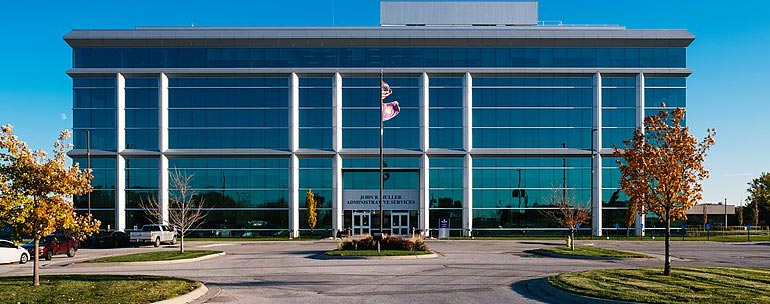
Bellevue University offers a Bachelor of Science in Software Development. Students must complete 127 credit hours to graduate. To be eligible for the program, applicants must have an associate degree, 60 qualifying credit hours, or a year of computer programming experience. Official transcripts must be submitted when applying.
Bellevue University is accredited by the Higher Learning Commission.

California State University offers a Bachelor of Science in Computer Science. Students must complete 120 credit hours to graduate. Applicants must have 60 transferable credits, a GPA of 2.0, and a grade of C or higher in English Composition, Speech/Oral Communication, Critical Thinking, and Mathematics.
California State University is accredited by the Western Association of Schools and Colleges.

Colorado Technical University offers a Bachelor of Science in Computer Science. Students may choose to add a concentration in Cybersecurity Engineering, Data Science, or Software Engineering.
To graduate, 183 credit hours must be completed. The school offers an open enrollment policy and allows applicants to apply online with no GPA or assessment test required.
Colorado Technical University is accredited by the Higher Learning Commission.
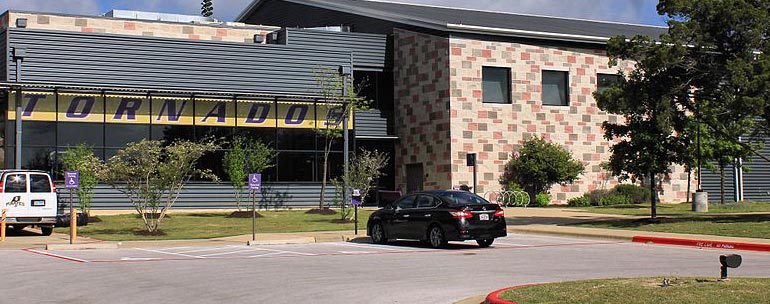
Concordia University—Texas offers a Bachelor of Arts in Computer Science. To graduate, students must complete 120 credit hours. The classes are 8 weeks long and taught online. Applicants must have a minimum high school GPA of 2.5 to be eligible for the program.
Concordia University Texas is accredited by the Southern Association of Colleges and Schools Commission on Colleges.
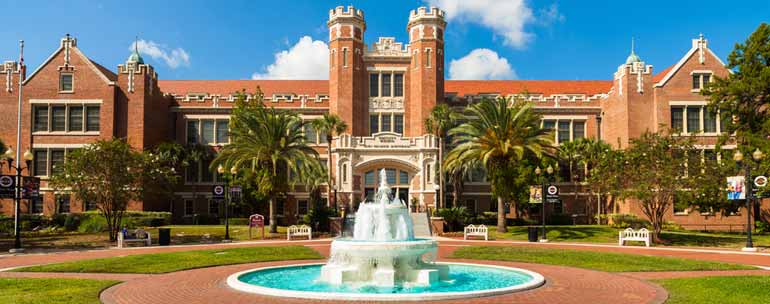
Florida State University offers both a Bachelor of Science and Bachelor of Arts in Computer Science. Both programs require students to complete 120 credit hours while maintaining a GPA of 2.5 to graduate. Applicants must submit ACT or SAT scores. While essays and resumes are not required, they may be submitted to bolster your application.
The Florida State University is accredited by the Commission on Colleges of the Southern Association of Colleges and Schools.
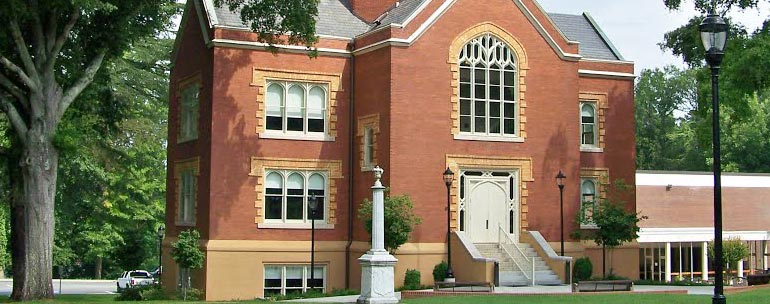
Limestone University offers a Bachelor of Science in Computer Science with a focus in Programming. The online program requires students to complete 120 credit hours, including a capstone project. Applicants must have a high school diploma or the equivalent, high school transcripts, and either SAT or ACT scores.
Limestone University is accredited by the Commission on Colleges of the Southern Association of Colleges and Schools.

National University offers a Bachelor of Science in Computer Science. Each class is 4 weeks long. To graduate, students must submit 180 quarter credit hours. Applicants must have a high school GPA of 2.0 or higher. If the applicant doesn’t have college-level English or Math courses, they must complete the ACCUPLACER scores.
National University is accredited by the WASC Senior College and University Commission.

Pennsylvania State University offers a Bachelor of Science in Software Engineering. To graduate, students must complete 126 credit hours and a capstone project. To be eligible for the program, applicants must have a high school GPA of 2.7 or higher and submit official transcripts.
The Pennsylvania State University is accredited by the Middle States Commission on Higher Education.
Getting Your Computer Coding Degree Online

A computer coding degree program can help you become fluent in a variety of commonly used coding languages. You will have the opportunity to study other aspects of computing as well.
This degree program can also help prepare you for a career in computer systems design or a related field. Due to the current prevalence of technology, coding is used in many different industries.
Many accredited universities have coding programs available online. The convenience of online computer programming degree programs is that they often let you schedule your studies around any work or life responsibilities.
If you’re ready to begin your educational journey, you can start exploring coding programs today to find the one that best fits your personal needs and goals.

